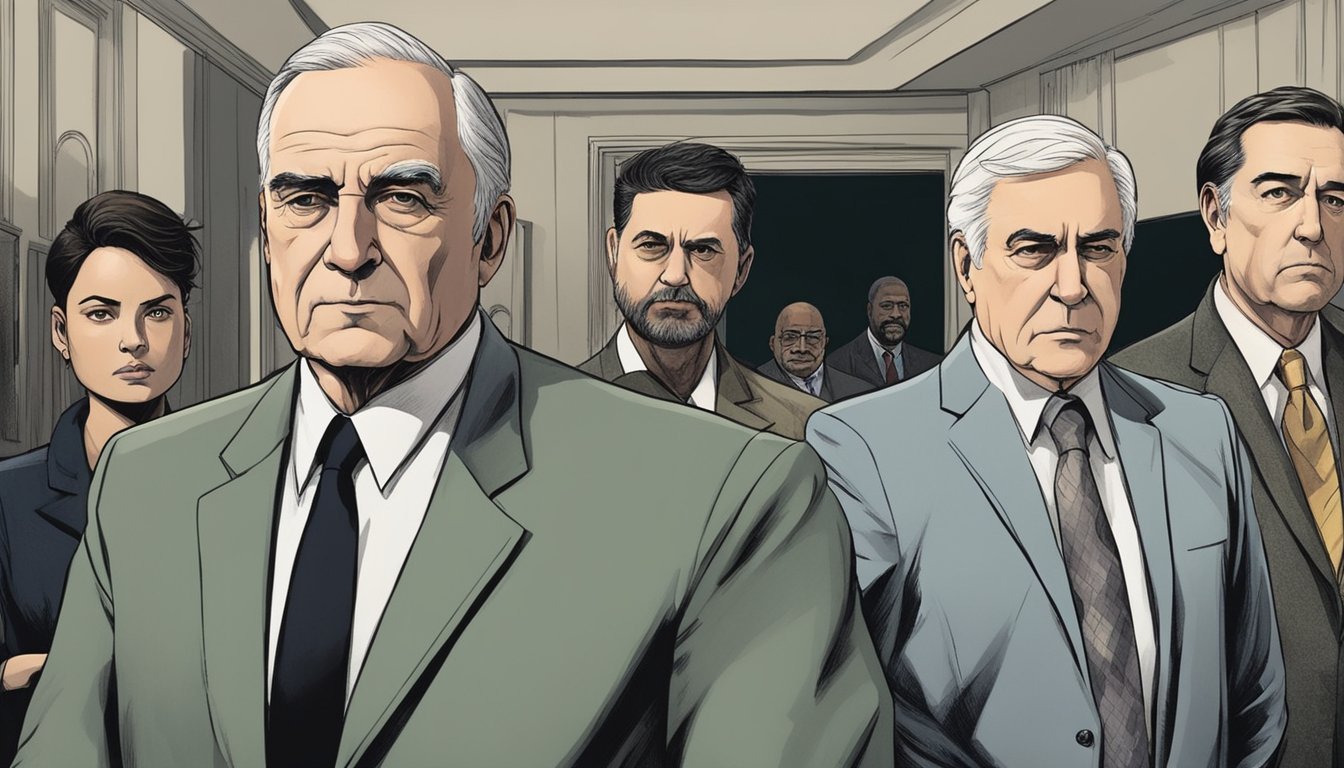The Importance of Family Ties in "The Night Agent": Exploring Loyalty and Trust in the Political Thriller
Family ties play a crucial role in shaping the narrative and character dynamics of "The Night Agent." The series explores how familial relationships impact decision-making, loyalties, and motivations of key characters. Peter Sutherland's journey as a Night Agent is deeply influenced by his desire to clear his family name and live up to his father's legacy.
The Bala crime family serves as a central antagonistic force in the second season, highlighting the dark side of family bonds. Their shared history of dictatorship and war crimes creates a tight-knit but dangerous unit driven by a common goal. The contrast between Peter's noble family motivations and the Balas' criminal enterprise underscores the show's exploration of how family ties can shape one's moral compass and life choices.
The French documents plot thread further emphasizes the importance of family connections in the series. These documents link various characters and their families to international conspiracies, demonstrating how personal relationships often intersect with larger geopolitical events. This intertwining of family and global intrigue adds depth to the storytelling and keeps viewers engaged throughout the season.
The Night Agent Overview
"The Night Agent" is a gripping thriller series on Netflix that blends action, espionage, and family drama. The show follows Peter Sutherland, a low-level FBI agent who becomes entangled in a high-stakes conspiracy.
Set in the world of covert operations, the series explores themes of loyalty, betrayal, and the blurred lines between personal and professional lives. Peter's journey takes him from answering a mysterious phone to becoming a field agent.
Key elements of the show include:
Intense action sequences
Complex political intrigue
Unexpected alliances and betrayals
Exploration of family ties and their impact on characters' motivations
The series has gained significant popularity since its debut, quickly becoming one of Netflix's most-watched shows. Its success led to a renewal for a second season, promising more thrilling espionage adventures.
"The Night Agent" stands out for its fast-paced storytelling and well-developed characters. The show's blend of personal drama and high-stakes national security issues keeps viewers on the edge of their seats.
As the story unfolds, family connections play a crucial role in shaping the narrative and driving character decisions. These relationships add depth to the plot, elevating it beyond a typical spy thriller.
Character Analysis and Development
The characters in "The Night Agent" undergo significant transformations as they navigate complex conspiracies and personal challenges. Their growth and development drive the narrative forward, revealing deeper layers of their personalities and motivations.
Peter Sutherland's Growth
Peter Sutherland, played by Gabriel Basso, starts as a low-level FBI agent and evolves into a skilled Night Agent. His journey is marked by intense challenges that test his loyalties and moral compass. Peter faces self-doubt as he uncovers government conspiracies, forcing him to question everything he believes in.
As the series progresses, Peter's determination and integrity shine through. He learns to trust his instincts and make difficult decisions under pressure. His relationship with Rose Larkin helps him open up emotionally, balancing his professional growth with personal development.
Peter's character arc culminates in his promotion to a full-fledged Night Agent, showcasing his increased confidence and competence in the field.
Rose Larkin's Journey
Rose Larkin emerges as a resilient and resourceful character. Initially a tech entrepreneur, she's thrust into a world of espionage after a tragedy befalls her family. Rose quickly adapts to her new reality, using her cybersecurity expertise to aid Peter in his investigations.
Her journey is one of self-discovery and empowerment. Rose overcomes her initial fear and shock, developing a keen sense of survival and problem-solving. Her relationship with Peter evolves from reluctant allies to trusted partners, both personally and professionally.
Rose's character growth is evident in her increased willingness to take risks and her ability to maintain composure in high-stress situations. Her tech skills prove invaluable throughout the series, highlighting her unique contributions to the team.
Supporting Characters and Their Trajectories
Supporting characters like Alice, Solomon, and Noor each have their own compelling arcs. Alice grapples with divided loyalties, torn between her duty and personal relationships. Her journey explores themes of redemption and the cost of secrets.
Solomon's character development revolves around his struggle with past actions and his desire to do right. His expertise and connections often prove crucial to the team's success.
Noor's trajectory showcases her growth from a suspicious ally to a trusted team member. Her skills and background add depth to the group dynamics.
Jacob Monroe's character arc explores the complexities of power and corruption, serving as a foil to Peter's integrity. These supporting characters' trajectories intertwine with the main plot, enriching the story's tapestry of conspiracies and personal growth.
Plot Dynamics and Themes
"The Night Agent" weaves a complex tapestry of espionage, familial ties, and moral dilemmas. The series explores the intricate relationships between characters as they navigate a world of secrets and conflicting loyalties.
Conspiracy and Intrigue
A web of conspiracy forms the backbone of "The Night Agent's" plot. Secret government programs like Foxglove drive the narrative forward, creating a tense atmosphere of suspicion. The Bala crime family emerges as a central force, their criminal activities intertwining with high-level political machinations.
Intelligence broker Jacob Monroe plays a pivotal role, dealing in valuable information that puts multiple factions at risk. The Iranian embassy in New York becomes embroiled in the unfolding events, adding an international dimension to the conspiracy.
Terrorist attacks loom as a constant threat, keeping characters and viewers on edge. The series skillfully balances revealing information and maintaining mystery to keep the audience engaged.
Family Ties and Loyalty
The Bala family stands at the heart of the story, exemplifying the complexities of familial bonds in a world of crime. Viktor Bala leads the family, his influence extending far beyond traditional criminal enterprises.
Tomás Bala's character highlights internal family conflicts. His British accent, a result of education abroad, symbolizes the tension between his upbringing and the family's criminal legacy.
The series explores how loyalty to family often clashes with personal morality and duty to country. Characters must repeatedly choose between protecting their loved ones and upholding their professional responsibilities.
Betrayal and Trust
Trust emerges as a precious commodity in the world of "The Night Agent." Characters forge alliances and friendships, only to have them tested by the harsh realities of their work.
Betrayal lurks around every corner, with double agents and hidden agendas constantly shifting the landscape. The series delves into the psychological toll of living in a world where trust is both essential and dangerous.
Rose Larkin's journey serves as a prime example of this theme. Her arc explores the delicate balance between forming connections and maintaining vigilance in a high-stakes environment.
The Moral Quandaries of Intelligence Work
"The Night Agent" doesn't shy away from the ethical challenges faced by those in intelligence work. Characters grapple with difficult decisions, often forced to choose between national security and personal integrity.
The specter of war crimes hangs over certain plot threads, raising questions about the limits of acceptable action in the name of national interest. Treason becomes a complex issue, with characters' motivations and loyalties constantly in flux.
The series presents these dilemmas without easy answers, inviting viewers to consider the gray areas of morality in a world of secrets and lies. Through its characters' struggles, it explores the personal cost of serving in the shadows.
Real-World Parallels and References
"The Night Agent" draws inspiration from real-world national security concerns, international politics, and intelligence operations. The show incorporates elements that mirror actual global events and geopolitical dynamics.
National Security and Terrorism
The series explores threats to national security, reminiscent of real-world terrorist activities. The Bala family's involvement in high-stakes plots echoes genuine concerns about domestic terrorism. Viktor and Tomás Bala represent the complex motivations behind extremist actions.
The White House's response to these threats in the show reflects real-world protocols for crisis management. The portrayal of intelligence briefings and security measures aligns with actual procedures used by government agencies.
Political and Diplomatic Elements
"The Night Agent" delves into the intricacies of international diplomacy. The Iranian Ambassador's role highlights the delicate nature of diplomatic relations. Tensions between nations are portrayed through carefully crafted dialogues and negotiations.
The show's depiction of the United Nations as a forum for global discussions mirrors its real-world function. Secret meetings and backroom deals in the series reflect the often-hidden aspects of international politics.
Global Intelligence Agencies and Double Agents
The series showcases various intelligence agencies, including the DGSE, mirroring the complex web of global espionage. Double agents and moles within these organizations parallel real-world cases of intelligence breaches.
The top-secret organization in the show reflects actual covert groups operating beyond public knowledge. The handling of sensitive French documents and interactions with Iranian dissidents highlight the high-stakes nature of intelligence work.
The series portrays the constant struggle between maintaining national security and protecting individual rights, a balance that real intelligence agencies grapple with daily.
Series Progression
"The Night Agent" builds on family relationships across its seasons. Characters grapple with personal ties while navigating complex plots and international threats.
Season 1 Recap and Impact
Peter Sutherland's journey as a low-level FBI agent thrust into a high-stakes conspiracy formed the core of Season 1. His relationship with Rose Larkin became pivotal as they uncovered a treasonous plot within the White House.
The season finale saw Peter promoted to Night Agent status by the President herself. This promotion set the stage for expanded storylines and deeper character development in the following season.
Family played a crucial role, with Rose's aunt and uncle central to the conspiracy. Their betrayal highlighted the theme of trust within familial bonds.
Season 2 Plot and Developments
Season 2 introduces the Bala crime family, adding a new layer of complexity to the show's exploration of family ties. The Balas' history of dictatorship and war crimes becomes intertwined with Peter's latest mission.
The Foxglove program emerges as a key plot element, linking the Bala family to international conspiracies. Chemical weapons, specifically KX gas canisters, become central to the season's conflict.
Peter faces challenges balancing his personal life with ongoing threats from crime networks. His relationship with Rose evolves amidst the danger.
The Future: Predictions for Season 3
While not officially confirmed, a potential Season 3 could delve deeper into unresolved plot threads from Season 2. Peter's personal life and ongoing threats from international crime networks may take center stage.
The show might explore new family dynamics, potentially introducing characters from Peter's or Rose's background. This could add depth to their motivations and relationships.
Expanding on the global scope of threats, Season 3 might introduce new criminal organizations or delve into government conspiracies spanning multiple countries.
Setting and Cinematography
"The Night Agent" utilizes carefully chosen settings and distinctive cinematography to enhance its storytelling. The show's visual elements contribute significantly to its atmosphere and thematic depth.
Iconic Locations and Their Symbolism
The UN Building features prominently, representing global diplomacy and high-stakes international relations. Its imposing architecture underscores the gravity of decisions made within its walls. Bangkok serves as a vibrant, exotic backdrop for crucial plot developments. The city's bustling streets and ornate temples create a stark contrast to the covert operations unfolding in its midst.
Warren, a fictional location, likely embodies small-town America, providing a grounding counterpoint to the series' more cosmopolitan settings. These diverse locations symbolize the far-reaching consequences of the characters' actions and the global scope of the conspiracy they uncover.
Utilization of Flashbacks
Flashbacks play a pivotal role in "The Night Agent," offering crucial backstory and character development. These scenes often employ distinct visual styles to differentiate past from present. Muted colors or grainy textures may be used for memories, creating a nostalgic or haunting atmosphere.
Flashbacks to Night Action training sessions reveal the rigorous preparation agents undergo. These glimpses into the past provide context for characters' skills and motivations. The strategic placement of flashbacks throughout the narrative builds tension and reveals information at key moments.
Aesthetic and Mood
The show's cinematography creates a moody, tense atmosphere. Low-key lighting in nighttime scenes adds to the sense of secrecy and danger. Quick cuts and handheld camera work during action sequences heighten excitement and urgency.
Contrasting color palettes differentiate various story threads. Cool blues might dominate official settings like the White House, while warmer tones could signify more personal moments. The overall visual style balances realism with cinematic flair, immersing viewers in the world of covert operations and high-level conspiracies.
The Show's Impact and Reception
"The Night Agent" made a significant splash upon its release. The series quickly garnered attention for its gripping storylines and well-developed characters.
Critics praised the show's intricate plot, particularly the inclusion of elements like the Foxglove Program. This storyline added depth to the series, drawing viewers into a world of international intrigue.
Public opinion was overwhelmingly positive. Audiences appreciated the show's blend of action, suspense, and family drama. The series' exploration of family ties resonated with many viewers.
"The Night Agent" received critical acclaim for its:
Compelling performances
Tight pacing
High production values
The show's success led to its renewal for multiple seasons. This decision reflects both its popularity and critical reception.
Viewers found the series' themes of loyalty, trust, and family particularly engaging. These elements contributed to the show's broad appeal across different demographics.
The series also sparked discussions about real-world issues related to national security and government transparency. This added an extra layer of relevance to the show's fictional narrative.
Behind the Scenes Insights
The creation of "The Night Agent" involved dedicated work from the cast and crew to bring the thrilling story to life. Production challenges were overcome through collaborative problem-solving and innovative techniques.
Cast and Crew Commentary
Gabriel Basso, who portrays Peter Sutherland, praised the show's intense action sequences. He highlighted the physical demands of his role and the extensive training required.
Amanda Warren, playing Special Agent Rose Larkin, noted the importance of chemistry among cast members. She emphasized how this translated into authentic on-screen relationships.
Luciane Buchanan, in the role of Rose Larkin, spoke about the challenge of balancing her character's vulnerability and strength. She worked closely with the writers to develop Rose's backstory.
Production Challenges and Triumphs
Showrunner Shawn Ryan faced the task of adapting Matthew Quirk's novel into a compelling series. He focused on expanding character arcs while maintaining the book's core tension.
Filming during the pandemic presented unique obstacles. The production team implemented strict safety protocols to ensure a safe working environment for all involved.
The show's night scenes required specialized lighting techniques. Cinematographers used innovative equipment to capture the atmospheric darkness crucial to the plot.
Stunt coordinators worked tirelessly to choreograph realistic fight scenes. They collaborated closely with actors to create dynamic and believable action sequences.
Fandom and Cultural Influence
"The Night Agent" has sparked a passionate fanbase and made a significant impact on popular culture. Its intriguing plot and complex characters have captivated viewers, leading to widespread discussions and creative engagement.
Fan Theories and Discussions
Online forums buzz with fan theories about "The Night Agent." Viewers speculate on character motivations, plot twists, and potential future storylines. Reddit threads dissect each episode, with fans sharing insights and debating key moments.
Social media platforms like Twitter and Instagram see regular trending topics related to the show. Fans create and share memes, quotes, and fan art inspired by their favorite characters and scenes.
The show's creators engage with fans through Q&A sessions and behind-the-scenes content, fueling further discussions. This interaction strengthens the bond between the series and its audience, creating a vibrant online community.
Merchandise and Media Expansion
"The Night Agent" merchandise has gained popularity among fans. Official products include:
T-shirts and hoodies featuring show logos and quotes
Replica props from key scenes
Character-inspired jewelry and accessories
Phone cases and laptop skins
The show's success has led to media expansions. A companion podcast explores episode breakdowns and cast interviews. An official tie-in novel delves deeper into the show's universe, providing backstories for fan-favorite characters.
The trailer for each season generates significant buzz. Fans analyze every frame for clues about upcoming plot developments. This anticipation drives social media engagement and boosts viewership for new episodes.










